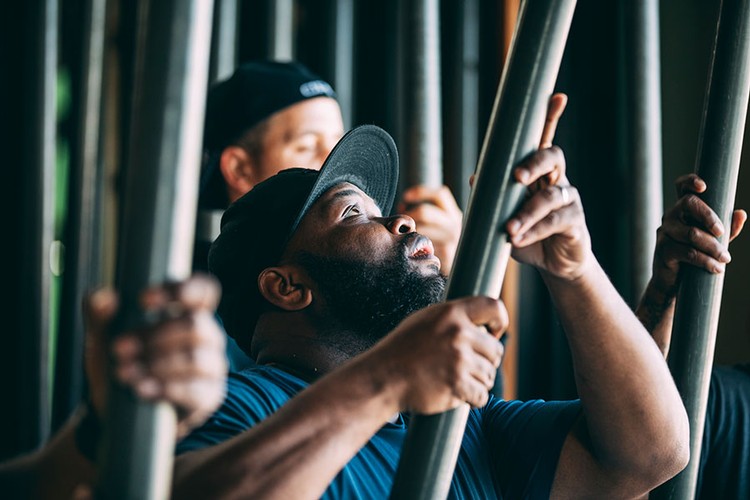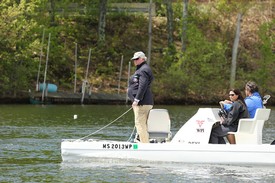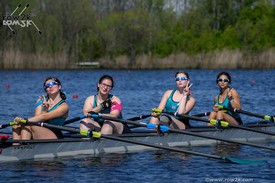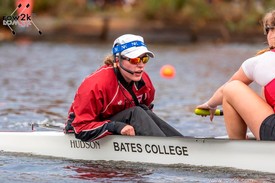
Read Part 1 of our interview here.
Back in early March, the new film A Most Beautiful Thing, directed by Mary Mazzio and based on the new memoir of the same title by Arshay Cooper, was doing some pre-theater release rounds in some very cool places - a Congressional viewing in Washington DC, and a festival appearance at South by Southwest.
Arshay and I had set up to do an interview about the film on Monday, March 16 - but by the time the day of the interview arrived, rowing was cancelled, SxSW was cancelled, and the March 27 debut of the film was cancelled. As everyone was scrambling to get themselves and their loved ones situated, we put off the interview until a more opportune time.
Since then, a LOT has happened, including a rescheduling of the film to a June 10 release, and then July 10, and now it is finally scheduled to happen in 17 cities on July 17. We finally got together last Friday for the very candid, powerful, and inspiring interview that follows.
We pick up in the middle of our conversation below; read Part 1 of the interview here. The interview has been edited very lightly for ease of reading.
Ed Hewitt:By the way, that 1:12 erg split in the film was legitimate.
Arshay Cooper: You know, it's so funny, there was one point that Malcolm did 1:08. I did 1:09, Alvin did 1:10, and Preston did 1:11. When we saw the film, I was like, "Mary, where's the 1:09?!?" (laughs) Bill McNabb was watching, saying "Oh my God." We were just messing around; I wish that was in the film. These guys are still strong, and they are powerful.

Ed:Going back to your last point, are there still kids that meet you, hear your story, and still think "No, this is not possible. I can't do that."
Arshay: Yeah, all the time. Sometimes I go to a school, and I don't split myself up a lot right away; I just go there and tell my story. But there are some kids that you can tell it's really tough to get through. To do that, I have to get to the deeper issue, the hurt. How do I get through to the hurt? And that's really bringing up the pain that I've been through. That kind of opens the Band-Aid a little bit for young people, and they become a little bit open.
So being authentic and telling a moving story, that the pain that you went through prepares you for your destiny - it is showing them, right? What they want to know is, "How do you get from A to Z? How do I live here, and do the things that you do?" What they need to see is a broken Arshay was a kid whose mother was a drug addict, who never said the word Dad a day in his life, who had a hard life. But now he has a book and a movie. What happened in the in-between?
If you tell him the success, the Dwayne Wade and the Grant Hill and the Common and the film, they are like, "Wow." But I say "I am the kid that no one expects they are going to get there, but this is how you get there." They all want to know how to do it. They all want to know how to get out. They all want to know how to be successful. But you have to tell them the steps to do it. You have to show them the success that will happen. It is really giving them the road map to becoming successful. You can give them the blueprint, that roadmap, and they are thinking "Okay, thank you for giving me this gift."

Ed: When we first started talking back the first week of March, you were starting to do a lot of stuff; getting ready for a theater launch, doing a Congressional screening in DC, getting ready to go to South by Southwest - and everything was postponed for reasons that we all know. Do you want to say anything about what that was like?
Arshay: It was like the rocket was going to the moon and the universe pulled it back down. It was like that race (in the film) where it was "Get to the finish line!" And then there was that crab, and you're thinking "Noooooo!" (laughs)
Ed: A major crab, right on the finish line, with boat stopped completely, you're so dead in the water there isn't even a beep.
Arshay: (laughs) That is what happened. We got hit by this crab, and you know, we can't let it knock us out of the boat. We have to breathe, recover, keep moving forward, keep going. And that was my mentality. It was just recover, breathe, and keep rowing.
But the opportunity was that, a lot of kids were battling things in college and high school level, and I was able to go and see them and really spend time with a lot of rowing athletes, some that were all white and that were all black. I was able to spend time with them, talk to them, educate them. And it gave me an opportunity to spend time with my baby.
And also, this film, it's better that it comes out this summer than in March. This is the time for it.
Ed: Call it your luck.
Arshay: Yup. Exactly.

Ed: You mentioned your new child. Mary made her first film for her daughter, and now you have a young child. How does that affect the way you think about having this story out there? It's something that your kid will see. Have you thought about that at all?
Arshay: I have. You want your daughter to know her family's history and where she came from. And it's for her. It's all about pure strength. And I want my daughter to row, and I want her to row at Penn. Penn is the place that we did our training camp where my life changed, and that's my goal for her. Yeah, I think about it all the time. I really just want her to sit on my shoulders and see what I see and know where she came from, to continue this legacy. I want her to just continue the legacy of what her dad did.
When you listen to Malcolm (in the film), really this is about our kids, it's about the next generation. You know, first of all, don't go this way, we've all been there. And second, everything that we do, we do for you, and we hope that they can do the same for their next generation.

Ed: So her dad is famous now; you are now a first-name guy in rowing. That can get tricky, right? Everyone knows you, and then especially now, everyone is looking to you. Has that been fun, at least?
Arshay: Yeah, it's hard (laughs), and it's fun. You can call me cocky, Ed, but I promise to God, something told me that the sport wasn't just for me, that I was for it. A lot of black people, and black rowers, and college rowers are going through a lot of things right now, and I'll tell you, not everyone, but some of the white community in rowing has really banded together to figure out how to help.
It's emotional. It's like you're doing a 2K, it's emotional, and it's hard as fuck. And you wish you someone could sit there for one minute, 30 seconds, to relieve you. And people are really coming together to help with that pressure. They are calling me, asking me what they can do. Sometimes I feel like I'm alone in this fight, and I'm not - there is Row New York and other places - but a lot of people call me, and I accept the responsibility. There is pressure, but pressure is good. Stress is not; I'm not stressed. It's just pressure, and it's good for you. And so, I accept it.
This is this is what it's all about. It's my goal that that Olympic 8, always, always, from 2020 on, reflect the diversity in our country. That's the ultimate goal. And I want to pump that to USRowing so they can do more. I want the kids that are brown to know that I want to see them there, and I want the world to help us get there. I want funders to help us get there, to make sure we have all the resources we need to do that. And that is important.
Ed: That makes total sense. So, what's next for you and the guys?
Arshay: At first, it was speaking tours (laughs). I don't know what is going to happen this fall of this year, but we said, at least once a year, let's try to enter a race - not a long race, but a short race (laughs) - and ride this wave. Use our lives to speak up on injustice, and love, and education, and hope, and entrepreneurship. And we are trying to see what will happen with this film. For now, what we talk about is this - sharing our stories with the world.

Ed: I have a question that I had written out to ask back early March when we were in touch, and it's a totally different question now. I don't even know if it can be answered right now, but maybe the answers are actually coming into focus somewhat. I was going to ask what folks can do to help crack through some of these issues.
Back in March, when we were going to talk the week before SxSW, readers might have read our talk on row2k and thought, "Hey, I'd like to get involved." What would you tell them they can do?
Obviously it is a different question and probably a different answer now, but I still want to ask it, to see if you have suggestions, requests, anything at all.
Arshay: There are a few things. Number one, you can donate an erg to a school. That is very simple. We also started a fund where 50% of everything we make on the film in the theaters goes right into the Pocock Foundation. And that fund will fund academic support for rowing programs that focus on diversity. The program will help with ergs, and with hiring coaches. You can give to that.
You can also donate to help a kid who can't go to the camps that some of their white teammates go to in the summer to get faster. You can give that. You can be an Olympian who says, "Hey, I want to share my story on my road to the Olympics," and call up these programs, and they'll love it. Show them your medal, volunteer your time, talk to them. Call up Row New York, Reach Out Baltimore, Chicago Training Center, Minnesota North Star, or Row Dallas; those places, you can find them, and ask them, "What can I do?"
Speak up. Use your voice, and speak up when you see something that's not right. There's more, and I'd have to think about it to come up with some other things.
Ed: Actually this is really clear. It is the same things, now and always: Speak up. If you have some time, offer it. If you have some dough, offer that. But do something.
Arshay: Yeah; give your time, talent, treasure, and use your voice. And we can move forward together. And listen; you have to listen. That is what we can do now. Volunteer, and do something courageous. I knew that, courageous is me going to tell the police cops to come meet me and row with me. Not caring what anybody else thinks, knowing that this has to work for my community. We have to know who they are, they have to know who we are. You know, do something courageous and brave and make an impact.
Ed: That (asking the police to row with them) could have tanked completely.
Arshay: It could have tanked completely. They could have been, you know, "No, I don't trust what they're going to do. I don't know about that."
Ed: "This is bullshit. "
Arshay: Yeah, this is bullshit. It was awkward at first, but just like you talk to kids who aren't sure about you, you can talk to cops, and tell them I've been out there, and this sport completely changed my life. I rowed with a group of guys who didn't get along, and the water is beautiful and healing. Sometimes when you're practicing, you are so calm, it's like when you are in the ocean or even when you're in the shower. There is just peace from the noise, from the city. And it's something that we kind of experience together - and get in shape at the same time.
Links:
- Arshay Cooper Instagram
- Preston Grandberry Instagram
- Malcolm Hawkins Instagram
- Alvin Ross Instagram
- Mary Mazzio Instagram
- A Most Beautiful Thing Instagram

If you enjoy and rely on row2k, we need your help to be able to keep doing all this. Though row2k sometimes looks like a big, outside-funded operation, it mainly runs on enthusiasm and grit. Help us keep it coming, thank you! Learn more.
Comments | Log in to comment |
There are no Comments yet
| |
- Bont Rowing
- Calm Waters Rowing
- Concept 2
- Craftsbury Sculling
- The Crew Classic
- CrewLAB
- Croker
- Dad Vail Regatta
- Durham Boat Co.
- Empacher
- Faster Masters
- Filippi
- Fluidesign
- h2row.net
- HUDSON
- Live2Row Studios
- Nielsen-Kellerman
- Oak Ridge RA
- Peinert Boat Works
- Pocock Racing Shells
- Race1 USA
- Rockland Rowing Masters Regatta
- RowKraft
- Rubini Jewelers
- Vespoli USA
- WinTech Racing
- Bont Rowing
- Calm Waters Rowing
- Concept 2
- Craftsbury Sculling
- The Crew Classic
- CrewLAB
- Croker
- Dad Vail Regatta
- Durham Boat Co.
- Empacher
- Faster Masters
- Filippi
- Fluidesign
- h2row.net
- HUDSON
- Live2Row Studios
- Nielsen-Kellerman
- Oak Ridge RA
- Peinert Boat Works
- Pocock Racing Shells
- Race1 USA
- Rockland Rowing Masters Regatta
- RowKraft
- Rubini Jewelers
- Vespoli USA
- WinTech Racing

















